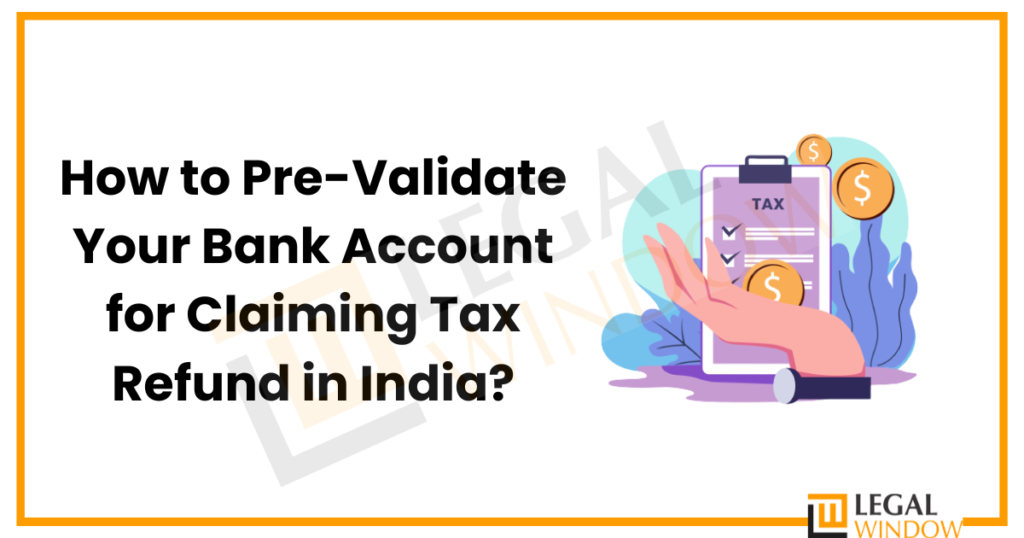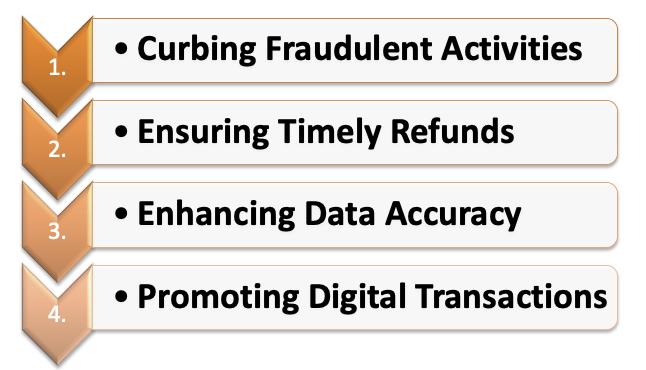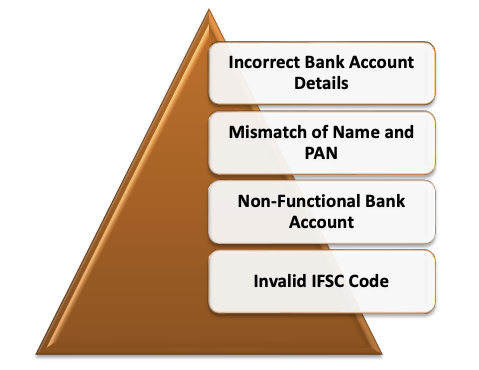How to Pre-Validate Your Bank Account for Claiming Tax Refund in India?
- August 19, 2023
- Income Tax

Filing income tax returns is an essential obligation for every taxpayer in India. It allows individuals to report their earnings and claim refunds if they have paid more tax than necessary during the financial year. To facilitate a seamless tax refund process, the Income Tax Department of India has introduced a pre-validation system for bank accounts. This system ensures that the refunds are credited only to the taxpayer’s authentic bank account, preventing fraudulent activities and providing a secure refund experience. In this article we will discuss about How to Pre-Validate Bank Account Claiming Tax Refund in India?
Before we move on discuss How to Pre-Validate Bank Account? Let us first discuss what is Pre- Validation of Bank Account and why is it important of pre-validating your bank account.
Understanding Pre-Validation of Bank Account
Pre-validation of bank accounts is a process introduced by the Reserve Bank of India (RBI) and National Payments Corporation of India (NPCI) to enhance the security and efficiency of financial transactions. It involves verifying and linking a customer’s bank account with their mobile number or any other unique identifier before initiating certain types of transactions. The primary objective is to prevent unauthorized or fraudulent transactions and ensure that funds are transferred accurately to the intended recipients.
The Need for Pre-Validation of Bank Account
Traditionally, income tax refunds in India were issued through cheques or demand drafts, which often resulted in delayed and cumbersome refund procedures. Recognizing the need to simplify this process and to encourage digital transactions, the Central Board of Direct Taxes (CBDT) introduced the pre-validation of bank accounts.
The primary objective behind pre-validation is to ensure that the income tax refunds are directly credited to the taxpayer’s authentic and verified bank account. This not only eliminates the risk of refunds being misappropriated but also expedites the refund disbursal process, making it more efficient and secure.
Importance of Pre-Validating Bank Accounts
In recent times, there have been numerous instances of incorrect or fraudulent claims for income tax refunds in India. Such cases not only hinder the efficient management of tax revenues but also lead to a loss of public funds and resources. To address these issues, the Indian government has introduced the pre-validation of bank accounts for taxpayers claiming income tax refunds. This process involves linking the taxpayer’s PAN (Permanent Account Number) with their bank account and validating it before processing any refunds.
The primary reasons why pre-validation of bank accounts is essential are as follows:

- Curbing Fraudulent Activities: Pre-validation helps in preventing unscrupulous individuals from submitting incorrect bank account details to claim someone else’s refund. By verifying the bank account beforehand, the chances of refunds being redirected to unauthorized accounts are significantly reduced.
- Ensuring Timely Refunds: In the absence of pre-validation, there is a risk of delays in the refund process. Incorrect bank account information can lead to refunds getting rejected, leading to additional paperwork and time-consuming rectification procedures. Pre-validation streamlines the process and ensures that refunds are credited promptly to the correct accounts.
- Enhancing Data Accuracy: The pre-validation system acts as an additional layer of data verification, promoting accuracy in the income tax refund process. It reduces the likelihood of errors caused by manual data entry or typographical mistakes, thus minimizing the need for corrective actions later on.
- Promoting Digital Transactions: The pre-validation of bank accounts aligns with the government’s push for digitalization and cashless transactions. It encourages taxpayers to provide valid bank account details and embrace digital payment methods for receiving their refunds.
Benefits of Pre-Validation of Bank Account for Claiming Income Tax Refund in India
Pre-validating bank accounts has numerous advantages for both taxpayers and the government, making it a vital step in ensuring a hassle-free and prompt refund process. The following are the benefits of Pre-Validation of Bank Account for Claiming Income Tax Refund in India:
- Elimination of Refund Delays: Pre-validating bank accounts has significantly reduced the time taken to process and transfer income tax refunds. In the past, delays were common due to discrepancies in bank account details or manual processing errors. By pre-validating the bank account, taxpayers can be assured that their refund will be credited directly to their verified bank account, minimizing the possibility of delays caused by incorrect information.
- Enhanced Security and Fraud Prevention: Fraudulent activities, such as claiming refunds in multiple accounts or using fake bank account details, were rampant in the earlier system. The pre-validation process has significantly reduced the likelihood of such fraudulent activities. It ensures that only genuine taxpayers receive their refunds, protecting the interests of both the government and honest taxpayers.
- Reduced Paperwork and Manual Errors: Prior to pre-validation, taxpayers were required to submit a physical copy of their bank account details through a refund reissue request. This cumbersome paperwork often led to errors and inefficiencies. With pre-validation, the entire process is digitized and automated, reducing the chances of manual errors and making it much easier for taxpayers to receive their refunds promptly.
- Increased Transparency and Tracking: Pre-validation offers greater transparency as taxpayers can easily track the status of their refund once it is processed. The Income Tax Department provides regular updates on the refund status through its online portal, allowing taxpayers to stay informed about their refund amount, date of credit, and any other relevant details.
- Cost-Effective and Environmentally Friendly: By digitizing the refund process through pre-validation, the government saves on printing and postage costs associated with sending physical refund checks. This move also aligns with the country’s broader commitment to environmental sustainability by reducing paper consumption and waste generation.
- Ease of Doing Business: Pre-validation is in line with the government’s vision of ease of doing business in India. By simplifying the process of claiming income tax refunds, taxpayers can focus on their core activities, knowing that the refund process is efficient and user-friendly.
Requirements for successful Pre- Validating of Bank Account for claiming Income Tax Refund in India
The requirements for successfully pre-validating a bank account for claiming income tax refunds in India are:
- A Valid PAN (Permanent Account Number): Before attempting to pre-validate a bank account, the taxpayer must have a valid PAN. PAN is a unique ten-character alphanumeric code issued by the Income Tax Department of India. It serves as a primary identification number for all tax-related transactions and is essential for the pre-validation process.
- Active Internet Banking Facility: To initiate the pre-validation process, the taxpayer’s bank account must be linked to an active internet banking facility. This is necessary as the pre-validation can be done only through the online platform provided by the Income Tax Department.
- Accurate Details of Bank Account: The taxpayer must ensure that all details provided during the pre-validation process are accurate. This includes the bank account number, IFSC code (Indian Financial System Code), bank branch name, and account holder’s name. Any discrepancies in this information can lead to a failed pre-validation, resulting in delays in receiving the income tax refund.
- Valid Mobile Number and Email Address: A valid and active mobile number and email address registered with the bank account are essential for pre-validation. These details will be used to send an OTP (One-Time Password) during the pre-validation process to verify the taxpayer’s identity.
- Linking PAN with Aadhaar: The taxpayer must link their PAN with their Aadhaar card. This linkage is crucial as it helps in establishing the taxpayer’s identity and prevents fraudulent claims. The linking can be done through the Income Tax Department’s e-filing website or other designated channels.
- Compliance with Income Tax Return Filing: The taxpayer should have filed their income tax returns for the relevant assessment year. Pre-validation is generally done after filing the return, and the refund amount is processed based on the return filed by the taxpayer. Ensuring timely and accurate filing of tax returns is vital for a successful pre-validation.
- Validated KYC Details with the Bank: Before proceeding with pre-validation, it is essential to have up-to-date Know Your Customer (KYC) details with the bank. This includes identity proof, address proof, and a recent photograph, among other documents. Accurate KYC details help in verifying the taxpayer’s identity during the pre-validation process.
How to Pre-Validate Bank Account?
Are you a Taxpayer, who is also thinking about “How to Pre-Validate Bank Account?” Don’t worry Tax Experts at Legal Window has tried to provide you the procedure in the simplest way. The following are the steps to pre-validate your bank account for claiming tax refunds in India:
- Step 1: Go to Income Tax Department Website on incometax.gov.into access the income tax e-filing site.
- Step 2: Select the ‘Login’ option and enter your login credentials (you can log in using your PAN or Aadhaar).
- Step 3: Navigate to ‘My Profile’ and then to ‘My Bank Account’ in the left pane.
- Step 4: Click the ‘Add Bank Account’ button to proceed.
- Step 5: Enter your bank account number, account type, account holder type, IFSC code, bank name, and bank branch information. To guarantee effective pre-validation, confirm that the PAN, name, mobile number, and email address supplied match those registered with your bank account. As a result, before proceeding, ensure that your PAN is linked or updated with your bank account.
- Step 6: After that, click the ‘Validate’ option. You have requested that the bank account be validated.
- Step 7: The pre-validation procedure is fully automated. Your bank information and request will be forwarded to your bank. Within 24 hours, the validation status will be posted on the portal.
- Your bank account information will show up in the ‘Added Bank Accounts’ page with the status ‘Validated and EVC enabled’ if the validation is successful.
- Details are shown under the “Failed Bank Accounts” page if the validation fails. It is possible to resubmit the rejected bank accounts for revalidation.
Procedure for checking the status of your request after Pre- Validation of Bank AccountIncome Tax Portal
You may check the status of your request using the methods listed below:
- When you click the ‘Pre-validate’ option, you will be sent to a screen that reads, “Your request for pre-validating bank account is submitted. The validation process is in progress and the status will be updated shortly.”
- Log in to the income tax e-filing website. Under the ‘Profile Settings’ page, select the ‘My Bank Account’ option. Your request’s status will be shown.
- If the bank account validation fails, the information will be presented. After 24 hours, you can add or remove bank accounts.
- You should also be aware that changing your mobile number or email address requires revalidation from the bank.
Common Validation Errors on the Income Tax Portal
While the pre-validation process is designed to be straightforward, taxpayers often encounter errors when trying to link their bank accounts for income tax refund claims. Here are some common validation errors and their possible solutions:

- Incorrect Bank Account Details: One of the most frequent errors is entering incorrect bank account information, such as the account number or the International Bank Account Number (IBAN). To resolve this, taxpayers must double-check and re-enter their bank account details accurately.
- Mismatch of Name and PAN: If the name on the bank account does not match the name registered with the PAN, the pre-validation will fail. In such cases, taxpayers should contact their bank to ensure that their account details match the PAN database records.
- Non-Functional Bank Account: A bank account that is dormant or non-functional cannot be pre-validated. To address this, taxpayers should ensure that their bank accounts are active and operational.
- Invalid IFSC Code: Providing an incorrect Indian Financial System Code (IFSC) is another common error. Taxpayers must verify the IFSC code with their bank or use the official IFSC code lookup tools provided by the Income Tax Department.
Way Forward
Pre-validating your bank account for claiming tax refunds in India is a straightforward yet crucial process. By following the steps mentioned above, you can ensure that your tax refunds are directly credited to your bank account, saving time and effort. Remember to file your income tax return on time and e-verify it to initiate the refund process. Prompt pre-validation and accurate information will ensure a hassle-free refund experience and contribute to efficient tax compliance.
CA Pulkit Goyal, is a fellow member of the Institute of Chartered Accountants of India (ICAI) having 10 years of experience in the profession of Chartered Accountancy and thorough understanding of the corporate as well as non-corporate entities taxation system. His core area of practice is foreign company taxation which has given him an edge in analytical thinking & executing assignments with a unique perspective. He has worked as a consultant with professionally managed corporates. He has experience of writing in different areas and keep at pace with the latest changes and analyze the different implications of various provisions of the act.
Categories
- Agreement Drafting (23)
- Annual Compliance (11)
- Change in Business (36)
- Company Law (148)
- Compliance (90)
- Digital Banking (3)
- Drug License (3)
- FEMA (17)
- Finance Company (42)
- Foreign Taxation (6)
- FSSAI License/Registration (14)
- GST (118)
- Hallmark Registration (1)
- Income Tax (200)
- Latest News (34)
- Miscellaneous (164)
- NBFC Registration (8)
- NGO (14)
- SEBI Registration (6)
- Section 8 Company (7)
- Start and manage a business (21)
- Startup/ Registration (130)
- Trademark Registration/IPR (40)
Recent Posts
- NGO Darpan Registration in Jaipur May 2, 2024
- Registration of Charges with ROC May 1, 2024
- Post incorporation compliances for companies in India April 30, 2024
About us
LegalWindow.in is a professional technology driven platform of multidisciplined experts like CA/CS/Lawyers spanning with an aim to provide concrete solution to individuals, start-ups and other business organisation by maximising their growth at an affordable cost.









